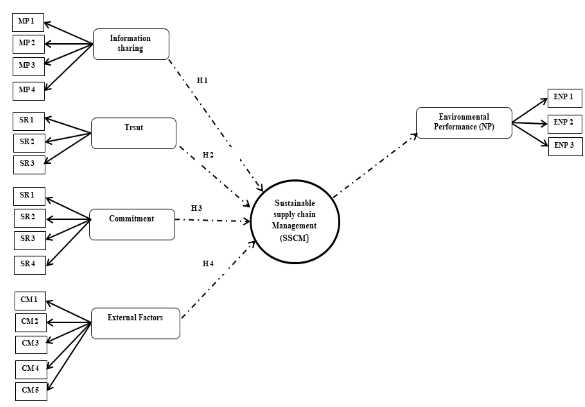Research Model
The model on which research is based assumes that there are drivers of sustainable supply chain management that influence organizations to pay attention to environmental issues. Information sharing, trust, commitment, and some external factors indicate to which extent the company engages in sustainable supply change management practices (see Figure 1). Environmental performance has been chosen as a dependent variable, and information sharing, trust, commitment, and specific external factors, including the type of an organization, number of employees at an organization, and total annual revenue, have been considered as independent variables.
The given study helps provide a conceptual framework for better understanding of how business ethics, coupled with external factors, drives firms to engage in sustainable supply chain management practices and whether these practices improve organization’s environmental performance.

The Profile of the Respondents
The study sample included 123 respondents working for UAE-based organizations. 46% of respondents worked at a hotel, and 54% of respondents worked at a hospital (see Table 1). 62.6% of the respondents served as a part of middle management, 32.5% of the respondents served as a part of top management, and the remaining 4.9% held other roles. 19% of respondents worked for an organization where the number of employees was less than 500. 10% of respondents worked for an organization where the number of employees was between 500 and 1000. The remaining 72% worked for an organization with more than 1000 employees. All the respondents were given a questionnaire with Likert scale questions to rate their organization in terms of information sharing, trust, uncertainties, and environmental performance.
Table 1. Profile of the Respondents.
Reliability, Regression, and Correlation
The reliability of separate variables and the internal consistency of the whole test were estimated using Cronbach’s alphas. Cronbach’s alpha values for all the variables are greater than 0.60, which indicates that all the questions in the questionnaire have reliably measured the variables (see Table 2). In particular, the lowest Cronbach’s alpha values of 0.64 and 0.68 are for information sharing and commitment correspondingly. Both external factors and environmental performance have the highest Cronbach’s alpha values of 0.79. Research has good internal consistency as the overall Cronbach’s alpha value is equal to 0.84.
Table 2. Cronbach’s Alpha Values.
To ensure that there is no multicollinearity and run a regression model, the correlation matrix has been created. As shown in Table 3, there is no strong correlation between independent variables. The highest correlation can be observed between information sharing and external factors (0.44) and trust and commitment (0.429). All the independent variables showed meaningful correlation with the environmental performance, though the highest correlation of 0.38 was with external factors, and the lowest correlation of 0.297 was with trust.
Table 3. Correlation Matrix.
Multiple regression was run to predict environmental performance based on information sharing, trust, commitment, and external factors. The independent variables have been tested for statistical significance using t-statistic. It can be seen that information sharing and trust do not have a significant impact on the environmental performance of an organization (see Table 4). In turn, commitment and external factors have a statistically significant impact on environmental performance.
All regression coefficients are positive, which means that there is a positive correlation between independent variables and the dependent variable. If all the independent variables are equal to zero, the environmental performance of a company is likely to be rated at 1.97 out of 5. Given a one-unit shift in information sharing, the environmental performance increases by 0.09. Given a one-unit shift in trust, environmental performance increases by 0.109. Given a one-unit shift in commitment, environmental performance increases by 0.172. Given a one-unit shift in external factors, environmental performance increases by 0.188.
Since the multiple regression coefficient is equal to 0.46, it can be stated that the calculated regression model with all independent variables predicts the dependent variable only in 46% of cases. The adjusted R-squared is equal to 0.18, which means that the improved regression model with two variables being excluded has not improved the prediction significantly (see Table 5). The coefficient of determination is equal to 0.21, so independent variables explain only 21% of the variability of environmental performance variable.
Table 4. Regression Coefficients.
Table 5. Regression Statistics.
Conclusion
Six hypotheses have been tested to assess sustainability measures in UAE-based organizations and their relation to environmental performance. Four independent variables, which are features of an organization’s business ethics and external factors, have been evaluated in terms of statistical significance. Information sharing and trust do not have a significant impact on the environmental performance of an organization (both p-values are greater than 0.05). Commitment and external factors have shown a statistically significant influence on the environmental performance of a company.
The results indicate that the environmental performance of an organization depends on the commitment and external factors, such as the type of an organization, the number of employees, and total revenue. Importantly to notice, both variables have almost the same positive influence on environmental performance. The test showed good internal consistency as each variable have been reliably measured. However, the multiple regression model that has been run predicts less than half of the values of environmental performance, which may be explained by correlations between independent variables or some important variables that have not been considered. Findings of research significantly add to the knowledge of how to enhance sustainability management and which factors drive the environmental performance of a company.